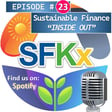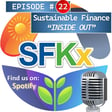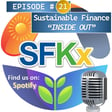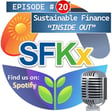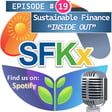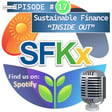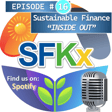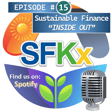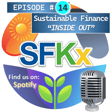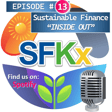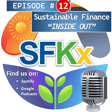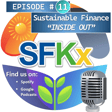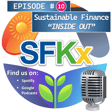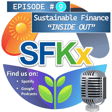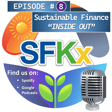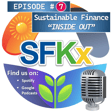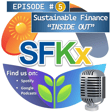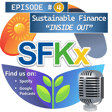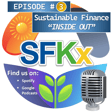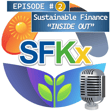Become a Creator today!Start creating today - Share your story with the world!
Start for free
00:00:00
00:00:01

SFKx Podcast Ep. 6 - Sustainable Finance "Inside Out"
Transcript
Introduction to Sustainable Finance Inside Out
00:00:09
Speaker
Hello again and welcome to Sustainable Finance, Sustainable Finance, excuse me, Inside Out podcast. This is number six with a bang. Number six LeBron James comes to mind, a big famous number six wearer, the big basketballer. Now, in case you haven't realized already, we are Sustainable Finance KX. We are an initiative that brings you the latest news, events, major breakthroughs and key concepts covering the happenings in this exciting part of the finance industry.
Recent Developments in Sustainable Finance
00:00:39
Speaker
Now without further ado, I've got a mate of mine, he's gonna join us very soon, a guy called SF Guru, Sustainable Finance Guru, to give us all the bits and pieces to bring up the speed of what's been happening in the last few weeks. SF Guru, let's kick us off.
00:00:55
Speaker
Great, thanks, SFGJ. As we normally say, good morning, good evening, good whatever salutation you'd like to our listeners right around the world. And thanks for the ongoing support of the podcast. We'll keep trying to pump these out every two-ish to three-ish sort of weeks. And as we say, we'll try and deliver as much context and news that's happening connected to sustainable finance. And we will also,
00:01:23
Speaker
give transactional details of some transactions in the public domain.
Geopolitical Impacts on Bond Volumes
00:01:28
Speaker
So let's start and jump into the news. So really look, mixed markets at the moment with I guess what's happening in Israel and Palestine and the Middle East. So probably best not to
00:01:39
Speaker
dip too much into forecasts and other things, because I think those geopolitical tensions are going to sort of color the market. And this isn't really a political podcast and trying to dissect and get into those those things. But obviously, yeah, that's right. So obviously, some major geopolitical tensions in the world is going to impact volumes on at least on the bond side. We know that the SLL loans and labor loans are a little bit down to so let's just see what happens.
Upcoming COP28 and EU Green Bond Standards
00:02:09
Speaker
But
00:02:09
Speaker
Apart from that loads and loads of other contextual things happening which are going to drive sustainable finance volumes going forward so that's more focus on the
00:02:17
Speaker
the positive elements of that rather than some of these other issues. The build up for COP28, I think in Dubai or Abu Dhabi within the next couple of months to close out the year, that'll start to really ramp up ongoing discussions of assets under management for ESG type of funds, a little bit of movement on those uptick, but different markets experiencing different
00:02:45
Speaker
uh different things um different things there what else have we got here uh water really starting to come up as a sustainability issue which it should have been all along and hopefully we see that featured as a in use of proceeds and also link transactions going forward the ongoing regulatory news side is more of the same i'd say EU and green bond standard haven't been
00:03:07
Speaker
Anointed, so to speak, a couple of weeks ago, more articles about that in SFDR, the way that fund managers are meant to label and market funds just keeps going round and on and up and down and thereabouts.
UK Transition Plan Disclosure Project
00:03:20
Speaker
But again, the reason why we mentioned the labeling
00:03:23
Speaker
considerations in the podcast is depending on how some of these rules land will impact on I think what bonds can be labeled and what bonds can and can't represent. So it's all a big sort of sort of
00:03:38
Speaker
Circle, I guess. Something else a bit more on the chunkier side was the UK transition plan or transition plan disclosure project. I'm trying to remember the name, the name now or TPT was a framework or I should say a group set up probably over the last 12 months or so. They've come up with a really good transition plan disclosure document
00:04:07
Speaker
and plans.
Nature in Transition Plans and Biodiversity Data
00:04:08
Speaker
It's really the gold standard, I think, or one of the best things I've seen in terms of the aspects of transition plans and governance and metrics and strategies and nature and just transitions and how to best think through that and communicate it. So I think that's going to be great. And once we see more, again, we talk about a lot on the podcast about the
00:04:31
Speaker
the infrastructure and the muscle around the bones these are the things that are gonna support corporate's disclose report on and that becomes the raw ingredients that banks and others can structure sustainable finance transactions from so to check that out there's a lot of really industry specific guidance as well from banking and fis and electric
00:04:55
Speaker
utilities and different kinds of aspects there. So it's all, you know, forward-looking information to better equip investors.
Practical Mitigation Measures in Sustainable Finance
00:05:04
Speaker
So look out for those and there'll be more happening. Speaking of transition plans, lots of articles about incorporating nature into transition plans, about more data we need for biodiversity and nature sort of continuing along the lines of what we talked about in the last podcast or two in the
00:05:25
Speaker
the TNFD. I nearly forgot the acronym then was launched back in the New York climate. Wait, too many acronyms sometimes SFDJ. Yeah. Let's jump on to scenarios produced by, of a short term nature, produced by NGFS. NGFS are the network for grading the financial system, a group of
00:05:50
Speaker
of central banks globally who have grouped and banded together. I think there's 30, 40, 50, probably plus now. And they've come up with a really interesting set of
Global Taxonomies and Transition Pathways
00:05:59
Speaker
scenarios. They've done the normal sort of longer term ones before, but shorter term ones. And I think the shorter term focus interim targets next for users is really important because we know that not all the time transactions have 10, 20, 30 years sort of timeframe. So more of the shorter term reference points I think is good.
00:06:19
Speaker
What else have we got here? There's an interesting article about Wendy's having to move its lettuce sourcing into greenhouses, not greenhouse gases, but it's interesting SFDJ that this is where I call the rubber hitting the road. I know it's a bit odd we're talking about
00:06:39
Speaker
you know geopolitics that we're talking about transition plans and other things but something like that is really tangible for a company if they can't get you know supply for one of their key ingredients and climate is impacting that you've got to take mitigation measures into hand and that's what sustainable finances meant to do but
00:06:57
Speaker
It's just sort of funny when you imagine a, you know, a hamburger or something with lettuce on it as something as simple as that. I mean, this starting to... Yeah, exactly. And when things bite, when issues bite, that's when change happens. Pardon the pun there.
00:07:13
Speaker
hydrogen hubs, blue bonds, more discussion of blue bonds, more discussions around taxonomies, and the Texas continue to produce really good information, probably the best that we've read on different taxonomies, and they produced an update, the rise and rise of global taxonomies, they produced a document, I think the geography of taxonomies was their first paper last year, maybe even the year before, and they've updated one talking about, you know, 17
00:07:43
Speaker
new taxonomies across the world, interoperability, can it be managed, can it not be managed, what language should we be using. There will be differences, but just how do we build the architecture to make sure that they speak to each other, at least in the same type of language, although some of the criterias and other things will
00:08:03
Speaker
will differ. So definitely check that out. It's been a pretty good month for last few weeks for reference points. So I've talked about the transition plan initiative in the UK. We've just talked about that paper from NGFS on short-term scenarios. We've talked about more in taxonomies from someone like New Texas.
Challenges for Coal Mining Companies
00:08:22
Speaker
Also the SPTI, Science Based Target Initiative, have been busy.
00:08:27
Speaker
And they've been busy releasing a draft paper for automakers. So what's really good about some of these reference points, transition pathway initiative, science-based target initiative, and the different versions of these entities that come out, it gives us something to mark and benchmark against.
00:08:46
Speaker
So if we're talking about linked transactions, it's harder to put something in the market without a really key benchmark. And the more sector specific they are, I think the easier the benchmark, the more information we have. And I think that's a really good thing. So do check that out. I think this was part update, part new, and it's all about what trajectories these automakers need to hit a 1.5 degree scenario there. So do check those out. Speaking of TPI,
00:09:14
Speaker
and continuing to roll through the news, TPI came out with an update on coal mining, I should say coal mining companies. So we won't go too much into that, but do check it out. Needless to say, there's a few issues in that and they've got some interesting curves and progress and what's happening in thermal coal versus metallurgical coal. Metallurgical
Job Growth in Renewables vs. Job Loss Fears
00:09:37
Speaker
coal, obviously we need more for steel making versus the thermal, more on the power side.
00:09:42
Speaker
do check that out if you're engaging. Maybe as an engagement tool, still pretty tough for coal related companies to participate in sustainable finance given the issues on that one longer term.
00:09:54
Speaker
Social, the need, back to that taxonomy point, more discussions around that. Carbon market biodiversity, again, to pick up that point again, starting to see more articles about biodiversity credits. Can biodiversity credits develop, learning the painful lessons of the carbon markets? Let's see, and I think more news will come out on that over time.
00:10:19
Speaker
A really interesting one again we sort of pick this up when we talked about the transition plan structure skeleton best version of. In relation to just transition so arenas the international renewable energy associate i'm gonna say association but i think i don't know what the stands for the basically un body.
00:10:38
Speaker
that produces a lot of information about renewable energy and reports and all those sorts of things. We'll talk about the world energy outlook probably in the next podcast which just came to market I think yesterday at time of recording. And really just talking a little bit about how the growth of jobs has grown for renewables, some have been lost in other industries.
Environmental and Social Interconnections
00:11:03
Speaker
So it's not all a net zero
00:11:07
Speaker
I should say a zero-sum game as we're going to lose heaps of jobs as we move to net zero, the jobs are just going to change. And I think there's good proof of a number of jobs all connected to renewables there.
00:11:21
Speaker
All right, what have we got here? A little bit more in nature. Pretty interesting article from Pollination and GSK talking about the interrelation between E and S from a nature and a health perspective. Expect more intersections of that going forward and probably more sustainable finance transactions picking up at that intersection to support companies doing both.
Guidance on Structuring Sustainability-Linked Bonds
00:11:43
Speaker
I really liked also SFDJ Carbon Trust came out with a
00:11:47
Speaker
greenwashing piece but it was quite well structured and there's a factual
00:11:55
Speaker
what they call F-A-C-T-U-A-L template. So do check that out. And again, we're going to see a lot more of this legislation about what you can call a fund, about what a company can say, what it can't say, what claims it can make, what it can't make. And again, this is all going to tie back into how we can talk about sustainable finance
00:12:17
Speaker
And we hope it's not too strict. Because if it's too strict, we won't see enough innovation. But it is a fine balance. Going back a little while now, Apple released, again, this is probably somewhat old news, talking about one of its new products being either carbon neutral. But we know that when something was originally made, whether it's recycled or whether it's, yeah, is recycled,
00:12:46
Speaker
Not all, there was some emissions from the start of that. So, you know, when products come out and they have these claims, you know, check it out. There's always, you know, emissions connected to some of those in one way or another. But being more circular, using more recycling is definitely a good thing. There's a heap of news this month, SFDJ. So let me keep on, keep whipping through.
00:13:08
Speaker
There's a really good
IEA's Net Zero Roadmap Update
00:13:09
Speaker
article on ICMA's website, International Capital and Market Association, talking about Q&A's connected to SLBs, you know, is capex okay as a KPI maybe, but it's indirect, M&A scenarios, groups, non-groups, subsidiaries, 10 years bonds, when should you set the observation date.
00:13:32
Speaker
should you be using offsets and all these type of things, it's actually pretty good. Most of it's common sense, I would say, but sometimes common sense is not all that common, and it's a good refinement in terms of guidance of how to structure those instruments, how to report on changes of KPIs and SPTs,
00:13:50
Speaker
A couple of contextual comments about penalties and those sorts of things. So do check that out. ESG ratings continue to be in the news. Different types of comments being made about impact. How do we get to impact? How do we ramp that up more rather than just talk about labels?
00:14:09
Speaker
The IEA also as if DJ came out with their updated net zero roadmap. If folks with keen ears on the podcast remember last, I think last, I'm going to say May, but I actually, it was actually, when was this? May 2021, geez, that's gone fast. A couple of years back, came out with a landmark report on net zero, a pathway to net zero.
Early Coal Plant Retirement in Asia
00:14:33
Speaker
And rather than just a
00:14:34
Speaker
a curve. Well, they did have a curve. They talked about a lot of qualitative steps about when buildings need to be green, when we all need to stop buying internal combustion engines, when we need to stop having any new coal, when we need to have certain percentages of renewable energy and those sorts of things. So I think it's a great reference
00:14:58
Speaker
And it's one of those things, again, for structuring sustainable finance transactions, sometimes we don't have a great reference, but something like this is a line to the thoughts around the IEA that green buildings must be totally annually efficient or green to some level by 2030 or 2035. Those are good things to anchor transactions to where sometimes benchmarking is not available. So do
00:15:26
Speaker
Checked out a couple of interesting points about nuclear getting revised upwards. The interesting thing probably from this is the new tech not available is about 50% of the emission reductions needed to 2050 to reach net zero. That number, that was the previous update. This update talks about 35%.
00:15:47
Speaker
You know, really having to rely on some of the things, you know, carbon capture hasn't come through at scale and having to really double down on batteries and solar power and all these other type of things. That's a great read. And again, to anchor thinking about milestones of certain transactions and engagement with customers, I think it's a great that's a great one to look at.
00:16:08
Speaker
Moving right along more in the Asian neck of the woods, the MAS came out with a really interesting paper. Again, I know we're pretty news heavy this month and we won't go through as many transactions as we normally do for the podcast, but there's a really interesting update that the MAS provided on cold buyouts.
00:16:27
Speaker
developing a set of carbon credits to which are based on avoided emissions from say a coal fired power plant stopping 10 years early. You convert those to some kind of carbon credit and people buy into that to help the financing because there's obviously positive NPV's and cash flow involved with the
00:16:47
Speaker
a set up power plant with a PPA and dragging that forward. So that's a really good article. Whether we agree with that kind of avoidance type of monetization into a carbon credit, I guess is beside the point. This paper is excellent because it has a lot of really good reference points. And as we know, the G fans came out a couple of months back
00:17:11
Speaker
in terms of opposed proposed approaches and thinking about retiring early coal plants. And that's going to be very, very important for Asia's march to net zero. But do check out the MAS paper. But essentially, it's that we'll retire it early, we'll avoid some emissions, we'll somehow monetize that because someone's got to pay for that too.
00:17:29
Speaker
To happen or or some losses are going to be pretty pretty big and we can't just turn off the tap on a lot of those assets and Strand them out or that'll distress Some more raps and more markets more on carbon credits World economic forum came out on scaling up voluntary carbon markets to check that out a playbook for corporate action again similar similar thought of themes to what we've talked about before PCAF came out with a
00:17:56
Speaker
updated European building emission factor database. And again, PCAF is an excellent tool. I can't remember the acronym now. I'm going to say portfolio carbon. Actually,
Planetary Boundaries and Environmental Pressures
00:18:12
Speaker
no, I've gone totally blank on that, but it's one of the carbon accounting foundations and a lot of the banks use their approaches to calculating and apportioning financed emissions for their scope three.
00:18:25
Speaker
What else have we got here? Talk about SMA and transition plans and building products for those. I'm not sure if folks will remember this but we often talk about planetary boundaries and there's about nine of those and there's an institute. I'm just going to look this up as well a group of scientists I think in Stockholm or somewhere fancy like that in Europe have come up with an updated report. I do recommend to
00:18:53
Speaker
to check those out. So basically of the nine boundaries, which is things like climate change, biospheres, land use change, land system change, freshwater, all the really important things. There's a lot of pressure on many of those.
00:19:11
Speaker
And do check that out. Again, it's a little bit of a compass type read as to where the pressure is on these climate systems, the climate systems being very dynamic, and the importance and the rapidness of some deterioration of those. Maybe that gives you an idea or a bit of a shopping list to address that and try and pinpoint it. But this is the first time that that particular group of scientists ever did an assessment fully on those nine
00:19:41
Speaker
on those 9R boundaries.
Wooden Buildings and Embodied Carbon Reduction
00:19:43
Speaker
So do check that out. All right, what have we got here? Look, that probably takes us through to all of the news and we'll jump to the other parts of the podcast. Actually, SF Guru, can I just jump in for a second? You talked about green buildings, carbon credits, carbon offsets. I've been hearing a lot about wood buildings.
00:20:03
Speaker
Is that sort of part of the, is that sort of getting some traction now, especially in the US? I know you're in Perth in Australia, actually, to get back to build the first wooden building. Is that, is that just a fat or is that something worth? No, look, I think, I think, I think the, the context around that is,
00:20:19
Speaker
You know, green, let's just say buildings represent probably six, seven, eight percent of global greenhouse gas emissions and a huge amount of energy use. So buildings, particularly in urban environments like Hong Kong, like a Singapore, they're at the heart of some of the net zero action that needs to happen. So step one, buildings import. Yeah, absolutely.
00:20:40
Speaker
Within a building, we've often focused on energy efficiency and operational type metrics, but really the bigger issue is what we call embodied carbon. And that relates to cement, that relates to all the other steel, all the other nasty emission related products. We need that stuff, right?
00:21:01
Speaker
And there's been a real push to think about, well, in urban environments, urbanization is going to increase, buildings are still at the center of this. What can we substitute? Because it's not easy to substitute many of these key things. So if you steal for 2,000 years and cement the most used product in the world after water. So these are really important. So I'd say it's niche.
00:21:26
Speaker
It's small, but it's just an example of something to substitute and say, hey, this type of building has a huge amount of embodied carbon. That's where the issue is.
00:21:37
Speaker
We've mastered, in many cases, the operational of, the efficiency of, and that's a never-ending task. But then how do you substitute versus a cement versus the other? I don't think we're going to see wooden buildings coming up all over the world because there's safety issues and building codes and they're very long-term change items, but it's good to see innovation.
00:21:58
Speaker
But it'll probably be of an innovation nature for some period. But I'd love to see more for sure. And I'd love to see a lot more low carbon steel and more low carbon cement, because that's probably the backdrop to that. Also, you've got to have a pretty good termite policy with those wooden buildings a year as well.
Fossil Fuels in Taxonomies: Canada Case Study
00:22:16
Speaker
Yeah, for sure. Sure. So look, there's other bits and pieces that the last thing I'd just say is CBI have come out or Climate Bond Initiative with some really good
00:22:27
Speaker
recent reports and taxonomies and using the Canada as a bit of a test case for discussions around fossil fuels, how they should be in taxonomies, not be in taxonomies, in transition taxonomies, not in. We'll leave that up to our listeners to check out, but they continue to provide lots of really good information and also there's even a report on Japan policies to grow credible transition
00:22:51
Speaker
similar to previous Climate Bonds Initiative work that's been done, but do check those out, because they're really good references. So, SF Guru, back to you for our next section. Now, thanks for that wonderful, wonderful summary. You've certainly done the rounds as always, so superbly done. Now, moving onto our next section, we always cover off the link transactions.
00:23:16
Speaker
in our next parts or linked instruments.
Sustainability-Linked Instruments in Companies
00:23:18
Speaker
And we know this is just for a bit of a recap for the newbies. This is your general purpose, I guess, financing, but obviously linked or tied back to some sort of ESG performance objective. So SF Guru, if you've had a bit of a break, can you take us through some highlights for linked instruments, please?
00:23:35
Speaker
Yeah. So on the linked instrument side, again, probably not as much volume as we have seen. It's always hard to get loan data on the bond side. We know there's a multitude of issues happening in the world, which can impact issuance. But a couple of interesting ones.
Updates on Green Bonds
00:23:50
Speaker
Compass. I don't think I thought it was the Compass food company was actually a gas, a gas company talking about biomethane and the distribution thereof.
00:24:01
Speaker
and some diversity metrics on their boards. Again, pretty common distribution of a sustainable product, I guess maybe more of an indirect type of KPI there, but obviously is a good thing. In terms of another one here, what have we got?
00:24:17
Speaker
which is a group related to more property. Again, Scope 1, 2 and 3 and GHGs aligned to Science Space Target Initiative. Pretty similar story on Watches of Switzerland. I don't know if they produced the old swatch, but the Watches of Switzerland group I probably should know, although I don't know about Watches.
00:24:39
Speaker
to add to well but i do have a soft spot for cashier's anyway i'm moving right along at marie techno months i'm an engineering company.
00:24:50
Speaker
Scope one and two, interestingly, again, one way you can attack scope three is not included, which is probably not good unless you have a small amount of scope three, include all of it, include absolute, include some sort of intensity measure for scope three or pick elements of it. And this was more on the upstream and the purchase sort of side and just specifying those.
00:25:12
Speaker
emissions, which is somewhat more controllable, if you can ever control scope three, I guess on the purchasing side is a little bit easier for some companies.
00:25:22
Speaker
Moving right along, Shri Ram, not Shri Ram, I know they sound exactly the same, an Indian chemicals company as opposed to the Indian microfinance company looking at, I couldn't actually find specifically there, but an SLR with HSBC in India. Chile, Anaxas, ENA, EXS, I have no idea how to say that, a Chilean mining company focused on GHGs and again, we need to be
00:25:51
Speaker
working, engaging, transacting with these type of companies, which is really important, even though they're in some lively industries, but we need a lot of stuff that's in the ground still. Funo was talking about increasing the certifications on his properties, which can be a workable KPI, I guess, but you want to have a pretty high level of certification rather than a basic one, because that might be more
00:26:16
Speaker
low ball and high ball, so to speak, and a development bank of Rwanda, SLBs for banks far less common. And I would say, we'll let our listeners figure out whether this should, could, would be more of a UOP deal or use of proceeds versus a link transaction.
00:26:38
Speaker
But it's been structured as a link transactions to implement environmental systems, loans to women, entrepreneur SMEs, affordable housing loans, which I guess are really more
00:26:51
Speaker
traditional use of proceeds, but this is more the performance thereof of how much are you doing? So let's see how that develops on the link side for banks. Some of those are a bit more indirect or maybe not as specific, but look all good stuff
Materiality of KPIs and Sustainable Tourism
00:27:09
Speaker
at the end of the day. All right, back to you, SFDJ. Thanks, Gurud. It's a nice segue, actually, as we now move on to use of proceeds or use of instruments. And it's funny you mentioned that
00:27:18
Speaker
Bank of Rwanda, it does sound as though they are funding specific sustainable activities or sustainable type projects. So you're right, it does sound more of a use of instruments. But let's, on that topic here, let's look at a couple of happenings and goings on in the area of use of instruments, please.
00:27:37
Speaker
Yeah, so use the proceed side. As we always do, we start with the sovereigns. India looking to do another bond at some stage. Denmark looking to do something else. Bosnia and Harris Kova. Again, I've probably butchered that name there. I'm looking at green bonds at some stage. Swiss, I think, going again. Romania, one of the munis there, which is good. We're seeing a bit of interesting news. I think we mentioned on the podcast last month that the UK looking at
00:28:07
Speaker
potentially backtracking or perceived backtracking on some of its climate commitments, but I think that they've recently done a transaction even in the midst of that that held up pretty well.
00:28:18
Speaker
Banks continuing to be major issuers. We saw some social bonds from NABARD, Fort Wright Bank, Bank Amnifal, Volksbank, and a whole bunch of others. And again, pretty broad frameworks, usually sustainability, sometimes green, right across the spectrum. Even some export development banks like EDC Canada getting into the action, and they have a role to play as they fund a lot of massive equipment around the place.
00:28:47
Speaker
What else have we got here? MBH, conglomerate side, metronet, telcoside, housing. So probably nothing new in terms of type of industry. And we've probably covered some of the types of things that a lot of these companies fund before, but good to see further geographic diversification. Some universities,
00:29:09
Speaker
raising money, some highways. Again, they can be a little bit topical. One in China, whether you've got coverage, you do no significant harm, whether that's good, whether that's bad. So a bit of a highway group there. What else have we got? Mazda, property side in Abu Dhabi, investment holding companies.
00:29:31
Speaker
algae energy and career on the energy side. EVs was pretty hot month for EV makers, Rivian, and also Volkswagen leasing, so either the construction production of or financing the leasing part there, because a couple of different ways the different parts of those groups fund.
00:29:52
Speaker
fund themselves, Valio on the tech side, Dutch gas infrastructures. Gas is creeping in on some of these green label transactions. We'll leave that up to our listeners how they prefer to label that. Is it transition? Is it green? Is it somewhere in between? I think as long as
00:30:13
Speaker
What's being financed is discussed and they do no significant harm, which is often for gas is methane leaks and also a lot of flaring and things in the process. It's not as clean as we think once we add all that stuff in. But again, these are important infrastructure gas assets that need to play a role somewhere, but hopefully we can pump them full of hydrogen over time and gradually transition some of those assets. Easier said than done.
00:30:42
Speaker
Our Maytex tank terminals, again, from a pure perspective, you might think, well, depending on what's in these tanks, a leasing-type business, is it fossil fuels, is it something else? If it is, presumably for a green transaction that was looking at tanks financing other things. But again, there's a real spectrum of some of these.
00:31:04
Speaker
On the material side, looking at some green loans in New York, we saw some social bonds for housing.
00:31:12
Speaker
Massachusetts, we saw some housing. And an interesting one we saw for Tricolor, which was a social ABS for lower income borrowers to finance some auto loans. So good to see, I should say on that side, we've traditionally seen securitization focused around solar loans, around different types of things rather than social SME loans or different, you know, even housing for that for that matter.
00:31:42
Speaker
So yeah, that's a lot of action on the you suppose side and SF guru back to back to you I think we it's about time to call up Murray Yeah, this is where we sort of hop into Murray our our bot and he puts us a Put us in a spot with a couple of questions now at the moment Murray hasn't actually Spoken to me this week. SF guru as he come to you for any questions then answering the maybe around
00:32:06
Speaker
Yeah, no, no, no, you're right. So there's a couple of questions. The first one was really in relation to what makes a material, what makes or drives the materiality of a KPI?
00:32:20
Speaker
And just for all our listeners, remember that IKMA has some really good resources on this. AP LMA, LMA have really good resources, some of it behind a paywall or membership walls, but it's really interesting information that you can check out. But just simplifying it, I think materiality has to be the key one or two issues focused by a company, not something that's number 10 or number 20.
00:32:44
Speaker
It's got to be something key at the heart of a company. And there's references points for that, whether it's SASB, whether it's GRI, whether it's materiality matrices from competitor companies, there's a whole range of, of reference points for those. And I guess once you've determined your issue, how you make sure that's material and materiality is, is often a little bit easier to define rather than, you know, ambition of, of your target.
00:33:12
Speaker
It's really about how much of that issue impacts the company. Is it just 5% of emissions that impact one tiny part of a group? So you have to look at that from either an economic perspective or a coverage perspective. And this sort of applicability and materiality, how important is it? How much of the business does it touch? And how much is sucked into that KPI? Are you just taking a little bit of cream off the top or are you actually sticking the cake in there as well?
00:33:41
Speaker
That's the first one. The second one's more of a, maybe it's a bit of a question too for our listeners as well, so we'd welcome any comments to send those in to us on our socials. But I guess sustainable tourism has a role from a social perspective in some markets, absolutely. But I think some markets such as luxury cruisers, cruising around the Antarctic,
00:34:10
Speaker
I think there's potentially a lot of significant harm issues that could be generated for that, which may be greater harm than the fact that maybe that vessel is green. Or maybe there's an element of we should support sustainable tourism because it's better than non-sustainable tourism. And then if we do, it's a sustainable activity and then we can connect financing to it. I think by its nature, tourism probably hasn't been sustainable in many places.
00:34:39
Speaker
So again, is the spectrum there? Can we support it from a social point of view? Absolutely. Is tourism going to go
Solar Installations and Climate Transition Funds
00:34:45
Speaker
anywhere? No. What's supported in sustainable finance? What's connected to sustainable finance from that element of tourism, I think, is going to be a topical one that keeps coming up and the different elements of that. So do check that. I guess the fundamental principle we're trying to illustrate there, or presumably why Murray asked the question, was
00:35:08
Speaker
whether you know how do you balance and it is a balance between the do no significant harm or the the bad stuff that comes from a sustainable activity and is the bad stuff outweigh the good stuff from a
00:35:23
Speaker
views, values, point of view, and people have some different views on that. So anyway, look out for sustainable tourism, because it's going to come up and we're going to see some, probably some, some fair ding dong battles on on that one as well. All right, SF, SF DJ, back to back to you to hit us, tell me what, what is our remaining segment? And then I think we're pretty much done.
00:35:46
Speaker
We've knocked off all the big ones today and interesting part around luxury cruise ships. Your preferred way of traveling I understand too Guru. As we come to a close, the final thing we always cover within product programs that look to integrate sustainability in day to day. So I think you might have a couple of updates for us there. Is that right?
00:36:05
Speaker
Yeah, and I think it's more of the same. I wish I had some, but I do think it's important we talk about these on the podcast because when there is a new program, when there is a new setup to scale something for SMEs, to launch a program rather than just individual transactions, it's more product-based. I think it's important to talk about. But again, more of the same solar installations, rooftops and bundling for those. I think that was in India.
00:36:31
Speaker
sustainable finance being a critical part for Standard Chartered's future roadmap. And again, sustainable finance programs, keen to see some of those rolled out at a product level as well. Let's see. HSBC talking about green tech loans. And I think
00:36:46
Speaker
That's interesting because I think if I'm not wrong, we're seeing a lot of funds being developed. Actually, that's my last point. Climate transition funds soaring. There's a lot. And maybe that's where we're going to see start more of the rubber hit the road on transition. If it's still too new, it may be unreasonable to expect the banking and the bond market to fund some of that. And we see some of the funds and the action from the banks.
00:37:12
Speaker
helping fund the funds and the funds taking equity positions and doing funky loans and other things. Let's see. Green exports, again, those export development agencies and getting involved in that. So again, a little bit more of the same from programs around tech loans, from programs around solar, from hopefully transition programs to looking at exports and trade flows, and then this ongoing
00:37:41
Speaker
increase of different types of funds, and then how they get into my intermediated into the financial system. So back to you SF DJ, and I think we're over and out for the month.
Conclusion and Call to Action
00:37:53
Speaker
I think that's just about brings us to a close. So that was a, well, first of all, a big thank you to SF Guru, your tonsils must be burning after that one, you've certainly earned your salary today.
00:38:04
Speaker
Anyway, that brings us to a close for Episode 6. Funny enough, Episode 6 is my favorite Star Wars episode. Return of the Jedi, mind you. We hope you like that podcast. Please check us out at SustainableFinanceKX.com. From there, you'll find all our socials and also a link to this podcast. So until next time, take care and we'll be in touch again. SF Geerhouse. Yeah, see you later and look forward to the next episode. Thanks for everyone's support. Yeah.
